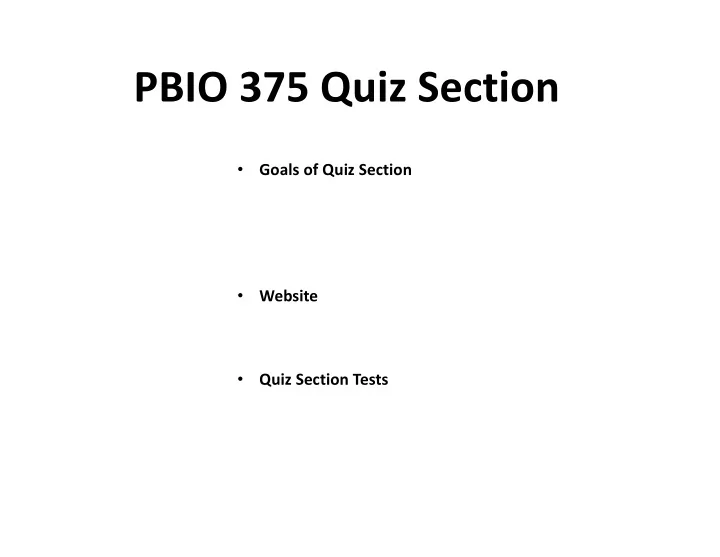

PBIO 375 Quiz Section Goals of Quiz Section • Website • Quiz Section Tests •
Quiz Section Tests 30 points each: 15 two-point questions • don’t need a purple answer sheet • fill-in questions • spelling counts (-0.5 for spelling errors) • will occur at the beginning of your section on • the scheduled day
EPITHELIA form the linings of hollow organs or cover surface of body (skin) • act as barriers • apical vs. basolateral • bound to underlying tissue by basement membrane (basal lamina) • classified by number of layers and cell shape •
Apical vs. Basolateral on course website
Basement Membrane Wheater, Fig. 9.3a basal surface of epidermis showing basement membrane (BM)
epidermis dermis hypodermis
keratin layer
Epidermis: Summary epithelium type: stratified squamous keratinized epithelium • protective • cells proliferate at basal surface • at apical surface cells fill with keratin and die •
Endothelium: Summary epithelium type: simple squamous epithelium • forms the lining of all blood vessels • capillaries consist of just endothelium • the blood-brain barrier is formed in part by tight • junctions between endothelial cells in brain capillaries
Blood-Brain Barrier Silverthorn, Fig. 9.5b (p. 279)
Airway Epithelium Silverthorn, Fig. 17.5a and 17.5b (p. 539)
Airway Epithelium: Summary epithelium type: pseudostratified ciliated epithelium • goblet cells in epithelium secrete mucus • submucosal glands secrete mucus • cilia move mucus to pharynx •
Tissue Layers in the Small Intestine
Wheater 14.25a electron micrograph showing columnar epithelium in the small intestine Wheater 14.25b high magnification electron micrograph showing microvilli (brush border)
Small Intestine Epithelium: Summary epithelium type: simple columnar epithelium • folding of epithelium into villi and crypts increases • surface area for absorption apical plasma membrane folded into microvilli • goblet cells in epithelium secrete mucus •
The Nephron is the Functional Unit of the Kidney Silverthorn, Fig.19.1e (pp. 591)
Wheater Fig. 16.17a EM of the proximal tubule with microvilli (Mv) and mitochondria (M)
Proximal Tubule in Kidney: Summary epithelium type: simple cuboidal epithelium • apical plasma membrane folded into microvilli • cells stain darkly due to presence of many • mitochondria
Protein-Mediated Transport Across Membranes Fig. 5.5 (p. 132) Silverthorn, Human Physiology, 8 th edition OPTIONAL READING: SECTIONS 5.4 (pp. 136-146) AND 5.6 (pp. 149-151)
Ion Channels Consist of a Water-Filled Pore through the Membrane Silverthorn, Fig. 5.11 (p. 140)
Facilitated Diffusion of Glucose
Insulin increases the number of glucose transporters on the cell membrane
Active Transport
The activity of the Na+/K+-ATPase creates a Na+ gradient Silverthorn, Figure 5.1d, p. 123
The activity of the Na + /K + -ATPase creates a Na + gradient Two ways to show a Na + gradient:
Secondary Active Transport
Carrier Proteins Can Become Saturated
ABC Transporters Structure of MDR1, an ABC transporter Figure 1B in Aller et al. (2009) Science 323: 1718-22 This is a stereo figure. To see in 3-dimensions, keep your head level, then cross your eyes slowly so that the two images come together in a single fused image in the center. Focus on the central image, which will be 3-D, and ignore the flat images to either side.
CFTR is an atypical ABC protein that works as a Cl- channel
Epithelial Transport simple epithelium
Absorption of Glucose (Small Intestine; also Reabsorption in Kidney)
Secretion of Fluid (Small Intestine and Airway Epithelium)
Clinical Example: Cystic Fibrosis
Clinical Example: Polyuria in Diabetes Mellitus The nephron is the functional unit of the kidney Silverthorn, Fig.19.1e (pp. 591)
Glucose reabsorption in the proximal tubule of the kidney
Carrier Proteins Can Become Saturated
Saturation of sodium-glucose cotransporters in the kidney tubules leads to polyuria
Clinical Example: SGLT2 Inhibitors SGLT2 is sodium-glucose cotransporter specific to proximal tubule • SGLT2 inhibitors are oral drugs • beneficial effects on cardiovascular outcomes; progression of • chronic kidney disease
Recommend
More recommend